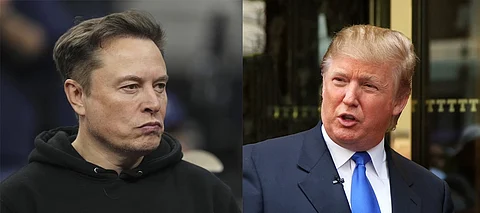

Elon Musk, the billionaire CEO of Tesla and SpaceX, has dramatically broken ranks with former US President Donald Trump, stepping down from his advisory role in the administration and launching a public attack on Trump’s flagship legislative effort, the “One Big Beautiful Bill” Act. This move not only signals a rift within the Republican power structure but also raises questions about potential ripple effects globally, including for India.
Musk recently concluded his stint as a special government employee, leading the Department of Government Efficiency (DOGE), an advisory body created by Trump to cut federal spending and streamline bureaucracy. His tenure was marked by aggressive cost-cutting, mass layoffs, and legal challenges.
Just after leaving his post, Musk called Trump’s signature spending and tax bill a “disgusting abomination,” warning that it would balloon the US deficit by $2.5 trillion and saddle Americans with unsustainable debt. He went further, threatening to campaign against Republicans who supported the legislation in the next midterm elections.
The bill, which narrowly passed the House, is central to Trump’s re-election platform and includes provisions like extending 2017 tax cuts and rolling back electric vehicle (EV) incentives—something that directly impacts Tesla’s business.
Musk’s main criticism is the bill’s massive increase to the federal deficit, which runs counter to his mandate as DOGE chief to reduce government waste.
The legislation eliminates tax credits for EV buyers, a move that could hurt Tesla’s US sales. This likely intensified Musk’s opposition, despite his previous support for Trump’s broader agenda.
Musk has also voiced concerns over Trump’s trade policies, particularly new tariffs, and has made it clear he doesn’t want to be held responsible for all of Trump’s actions, highlighting their policy disagreements.
Business and diplomatic favors: Musk has repeatedly expressed interest in India’s market, especially for Tesla and Starlink. He met Prime Minister Narendra Modi in Washington, discussing collaboration in AI, space, and sustainable development. Despite these overtures, Musk’s social media company X (formerly Twitter) has sued the Indian government over content censorship, showing that his relationship with India is complex and sometimes confrontational.
While Elon Musk himself has not made major investments in India yet, his father, Errol Musk, recently visited India to promote green technology and praised India’s leadership and economic rise.
The potential impact of Elon Musk’s recent fallout with Donald Trump and his shifting US policy stance on India is multifaceted. For US-India technology ties, Musk’s distancing from American political circles could slow down some collaborative projects in areas like artificial intelligence, electric vehicles (EVs), and space, but it may also allow him greater flexibility to pursue independent business ventures in India. In the EV market, the rollback of US incentives for electric vehicles might push Tesla to accelerate its plans for entering India, especially as the country has introduced more EV-friendly policies. However, Tesla has so far shown interest only in opening showrooms, not in manufacturing locally, which limits its immediate impact on the Indian auto sector and leaves domestic players like Tata and Mahindra in a strong position. Geopolitically, Musk’s criticism of deficit spending and government overreach in the US may resonate with Indian policymakers who are focused on fiscal discipline, but his companies’ legal and regulatory challenges in India, such as Starlink’s delayed approvals and X’s disputes over content moderation, underscore ongoing friction. Finally, while Musk’s global reputation and his father’s vocal support for India could attract international attention and investment in India’s green technology sector, the lack of a firm manufacturing commitment from Tesla and regulatory hurdles for Starlink suggest that any transformative impact on India is likely to be gradual and limited in the near term.
Musk’s tenure as DOGE chief was unpaid but highly influential, with his reforms leading to tens of thousands of job cuts and lawsuits. He also donated over $250 million to Trump’s campaign, underlining his financial clout in US politics.
- Departure on Good Terms: Despite the public spat, both Musk and Trump insist they parted amicably, with Musk stating he would remain available for advice if needed.
Musk has consistently advocated for Tesla’s entry into India, negotiating with the government over import duties and local manufacturing requirements.
Elon has met with Indian leaders to discuss technology partnerships, and his companies have eyed India as a key future market.
While generally supportive, Musk’s companies have also challenged Indian government policies, reflecting a pragmatic rather than purely supportive approach.
Musk’s break with Trump reflects deep policy disagreements, especially on fiscal responsibility and EV incentives, that have direct business implications. For India, this could mean both new opportunities (as Tesla looks for growth outside the US) and ongoing challenges (as Musk’s companies push back against Indian regulations). Musk’s engagement with India has been significant, though often transactional and strategic rather than purely ideological or consistent.